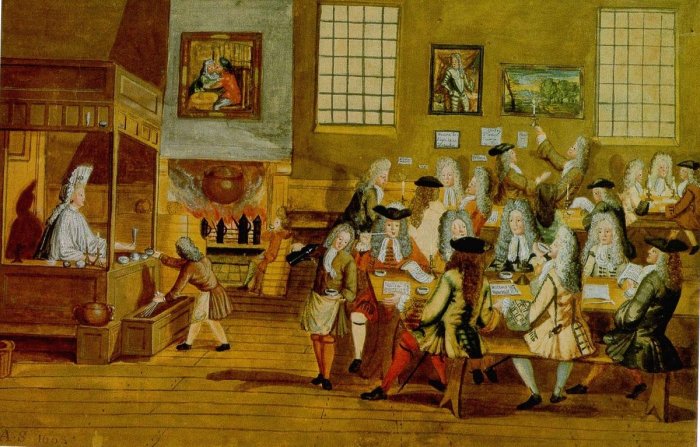King Charles II Of England Banned Coffeehouses In 1675
Ellen Lloyd - AncientPages.com - In 1675, King Charles II of England issued a proclamation to end the legality of coffeehouses. He banned coffeehouses and forbade people from selling coffee, chocolate, sherbet, and tea from any shop or house.
Charles was born on 29 May 1630, the eldest surviving son of Charles I. He was 12 when the Civil War began and two years later was appointed nominal commander-in-chief in western England. With the parliamentary victory, he was forced into exile on the continent. He was in the Netherlands when, in 1649, he learned of his father's execution.
In 1650, Charles made a deal with the Scots and was proclaimed king. With a Scottish army, he invaded England but was defeated by Cromwell at the Battle of Worcester in 1651. He again escaped into exile, and it was not until 1660 that he was invited back to England to reclaim his throne. His past could be the reason why he became suspicious of various plots against him.
In the 17th century, London coffeehouses became very popular. In the late 1600s and early 1700s, there were as many as 3,000 coffee houses in London, and they were a center for gossip. Intellectuals, professionals, and merchants thronged to the coffee houses to debate, distribute pamphlets, do deals, smoke clay pipes, and, of course, to consume a drink.
The popularity of the coffeehouses made King Charles II nervous, and he made an attempt to ban them.
Interior of a London Coffee-house, 17th century. Credit: Public Domain
King Charles II's argument was that coffee houses disturbed the peace of the realm and promoted idleness and some scurrilous and defamatory rumor-mongering. Of course, the true reason why King Charles II wanted to get rid of these meeting places was of a political nature. He suspected coffeehouses offered a perfect opportunity for plotting sedition and treason among the population.
A PROCLAMATION
FOR THE
Suppression of Coffee-Houses.
CHARLES R.Whereas it is most apparent, that the Multitude of Coffee-Houses of late years set up and kept within the Kingdom, the Dominion of Wales, and the Town of Berwick on Tweed, and the great resort of Idle and disaffected persons to them, have produced very evil and dangerous effects; as well for that many Tradesmen and others, do therein mis-spend much of their time, which might and probably would otherwise by imployed in and about their Lawful Callings and Affairs; but also, for that in such houses, and by occasion of the meetings of such persons therein, diverse False, Malitious and Scandalous Reports are devised and spread abroad, to the Defamation of His Majesties Government, and to the Disturbance of the Peace and Quiet of the Realm; his Majesty hath thought it fit and necessary, That the said Coffee-houses be (for the future) put down and supressed, and doth (with the Advice of his Privy council) by this Royal Proclamation, Strictly Charge and Command all manner of persons, That they or any of them do not presume from and after the Tenth Day of January next ensuing, to keep any Publick Coffee-house, or to Utter or sell by retail, in his, her, or their house or houses (to be spent or consumed within the same) any Coffee, Chocolet, Sherbett or Tea, as they will answer the contrary at their utmost perils.
And for the better accomplishment of this his Majesties Royal Pleasure, his Majesty both hereby will and require the Justices of the Peace within their several Counties, and the Chief Magistrates in all Cities and Towns Corporate, that they do at their next respective General Sessions of the peace (to be holden within their several and respective Counties, Divisions and Precincts) recall and make void all Licences at any time heretofore Granted, for the selling or retailing of any Coffee, Chocolet, Sherbett or Tea. And that they or any of them do not (for the future) make or grant any such Licence or Licences to any persons whatsoever. And his Majesty doth further hereby declare, that if any person or persons shall take upon them, him or her, after his, her or their Licence or Licences recalled, or otherwise without Licence, to sell by retail (as aforesaid) any of the Liquors aforesaid, that then the person or persons so Offending, shall not only be proceeded against , upon the Statute made in the fifteenth year of his Majesties Reign (which gives the forfeiture of five pounds for every moneth wherein he, she or they shall offend therein) but shall (in case they persevere to Offend) receive the severest punishments that may by Law be inflicted.
Given at our Court at Whitehall, the Nine and twentieth day of December 1675, in the Seven and twentieth year of Our Reign.
God save the King
The law to ban coffeehouses was passed on December 29, 1675, and was supposed to become active on January 10, 1676, but it was abolished on January 8. The undoing of the ban was backed by several ministers of Charles II, who themselves were lovers of coffee.
Written by - Ellen Lloyd – AncientPages.com
Copyright © AncientPages.com All rights reserved. This material may not be published, broadcast, rewritten or redistributed in whole or part without the express written permission of AncientPages.com
Expand for referencesReferences
The Old Foodie
More From Ancient Pages
-
 Enigma Of Étienne Le Ray – Unusual Vagabond Prophet Nicknamed Nostradamus Of Brittany
Ancient Mysteries | May 22, 2025
Enigma Of Étienne Le Ray – Unusual Vagabond Prophet Nicknamed Nostradamus Of Brittany
Ancient Mysteries | May 22, 2025 -
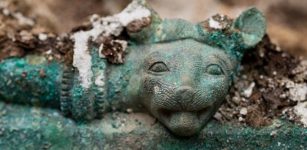 Tomb Of Celtic Prince Has Been Unearthed In France
Archaeology | Mar 5, 2015
Tomb Of Celtic Prince Has Been Unearthed In France
Archaeology | Mar 5, 2015 -
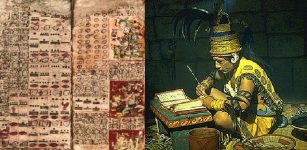 Mysterious Ancient Mayan ‘Copernicus’ And The Venus Table Of The Dresden Codex: The Hieroglyphs Have Been Misunderstood – Researcher Says
Archaeology | Aug 23, 2016
Mysterious Ancient Mayan ‘Copernicus’ And The Venus Table Of The Dresden Codex: The Hieroglyphs Have Been Misunderstood – Researcher Says
Archaeology | Aug 23, 2016 -
 Neanderthals Were Morning People – A New Study Says
Biology | Dec 14, 2023
Neanderthals Were Morning People – A New Study Says
Biology | Dec 14, 2023 -
 Thor’s Hammer Pendant Found In Norfolk May Be Linked To The Great Heathen Army
Archaeology | Oct 24, 2023
Thor’s Hammer Pendant Found In Norfolk May Be Linked To The Great Heathen Army
Archaeology | Oct 24, 2023 -
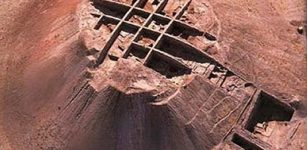 Norsuntepe – Little-Known Mysterious Prehistoric Site In Anatolia, Turkey: Why Was It Abandoned And Destroyed By Fire?
Civilizations | Mar 13, 2014
Norsuntepe – Little-Known Mysterious Prehistoric Site In Anatolia, Turkey: Why Was It Abandoned And Destroyed By Fire?
Civilizations | Mar 13, 2014 -
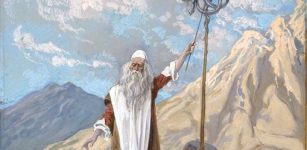 Enigma Of Nehushtan – The Biblical Copper Snake
Biblical Mysteries | Oct 31, 2018
Enigma Of Nehushtan – The Biblical Copper Snake
Biblical Mysteries | Oct 31, 2018 -
 How Can AI Affect Human Evolution? Predicting Changes In Brain Size And Social Behaviors
Evolution | Nov 22, 2024
How Can AI Affect Human Evolution? Predicting Changes In Brain Size And Social Behaviors
Evolution | Nov 22, 2024 -
 World’s Oldest Wine Found In 2,000-Year-Old Roman Tomb In Carmona, Spain
Archaeology | Jun 19, 2024
World’s Oldest Wine Found In 2,000-Year-Old Roman Tomb In Carmona, Spain
Archaeology | Jun 19, 2024 -
 Why Napoleon’s Invasion Of Russia Was A Fiasco
Ancient History Facts | Mar 31, 2017
Why Napoleon’s Invasion Of Russia Was A Fiasco
Ancient History Facts | Mar 31, 2017 -
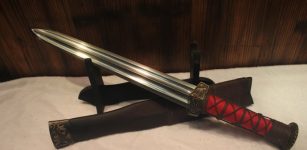 Deeper Look Into Chinese Swords Throughout The History Of The Dynasties
Featured Stories | Sep 19, 2018
Deeper Look Into Chinese Swords Throughout The History Of The Dynasties
Featured Stories | Sep 19, 2018 -
 Mysterious Mythical City Found In One Of North America’s Beautiful National Parks
Featured Stories | Feb 25, 2025
Mysterious Mythical City Found In One Of North America’s Beautiful National Parks
Featured Stories | Feb 25, 2025 -
 Ancestral Māori Adapted Quickly In The Face Of Rapid Climate Change – New Study Shows
Archaeology | Nov 10, 2022
Ancestral Māori Adapted Quickly In The Face Of Rapid Climate Change – New Study Shows
Archaeology | Nov 10, 2022 -
 On This Day In History: Eminent Scottish Inventor Graham Bell Born – On Mar 3, 1847
News | Mar 3, 2017
On This Day In History: Eminent Scottish Inventor Graham Bell Born – On Mar 3, 1847
News | Mar 3, 2017 -
 15,000-Year-Old Petroglyphs Discovered In The Gobi Desert May Be Evidence Ancient Turks Visited Mongolia – Expert Says
Archaeology | Apr 5, 2022
15,000-Year-Old Petroglyphs Discovered In The Gobi Desert May Be Evidence Ancient Turks Visited Mongolia – Expert Says
Archaeology | Apr 5, 2022 -
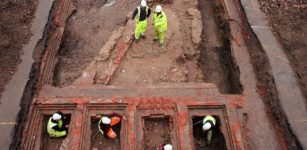 Early Twelfth-Century Castle Walls Unearthed Outside Gloucester, England
Archaeology | Dec 9, 2015
Early Twelfth-Century Castle Walls Unearthed Outside Gloucester, England
Archaeology | Dec 9, 2015 -
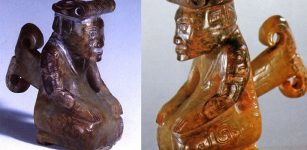 Peculiar Artifact Discovered In Tomb Of The Warrior Queen Fu Hao
Artifacts | Oct 26, 2018
Peculiar Artifact Discovered In Tomb Of The Warrior Queen Fu Hao
Artifacts | Oct 26, 2018 -
 Last Homo Erectus Lived 117,000 Years Ago At Ngandong
Archaeology | Dec 19, 2019
Last Homo Erectus Lived 117,000 Years Ago At Ngandong
Archaeology | Dec 19, 2019 -
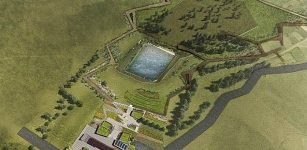 “Hittite Forest” That Grew 4,500 Years Ago Will Be Created In Alacahöyük, Turkey
Archaeology | Dec 21, 2015
“Hittite Forest” That Grew 4,500 Years Ago Will Be Created In Alacahöyük, Turkey
Archaeology | Dec 21, 2015 -
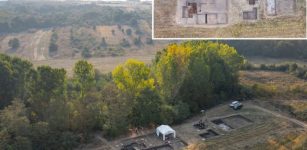 8,000-Year-Old House Remains Discovered In Svinjarička Čuka, Serbia Raise Questions About Europe’s First Farmers
Archaeology | Oct 21, 2024
8,000-Year-Old House Remains Discovered In Svinjarička Čuka, Serbia Raise Questions About Europe’s First Farmers
Archaeology | Oct 21, 2024


